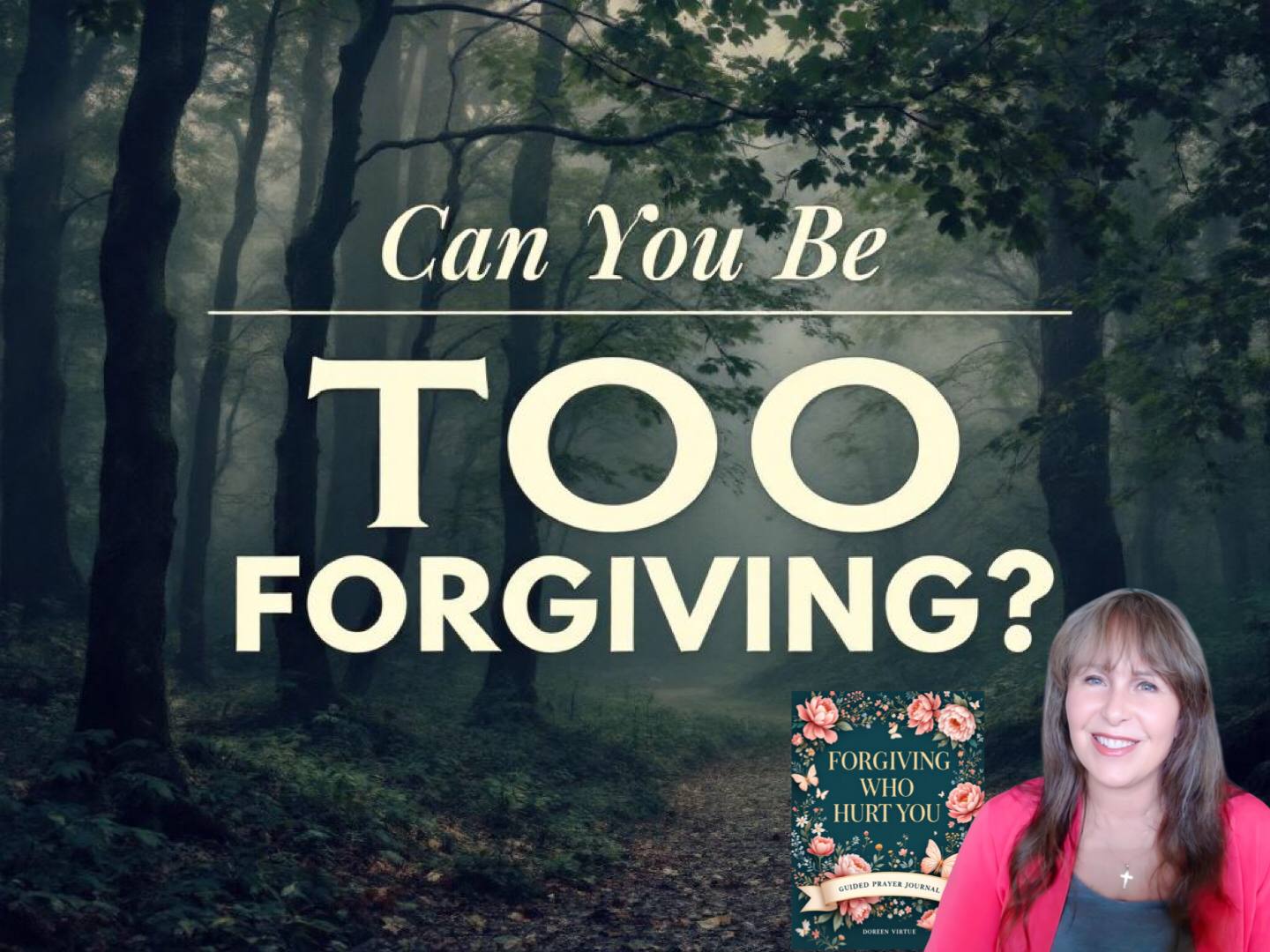⏱️ Estimated Reading Time: 3 min read
Can You Be Too Forgiving?
By Doreen Virtue, author of “Forgiving Who Hurt You” guided prompt journal
The world whispers cautions that you can be too forgiving: they’ll say you’re a fool if you let it go, they’ll tell you that your mercy makes you a doormat and that you ought to hold on to your grudges like armor lest you get wounded once more. Yet when we open the Bible and behold our Savior, we find a pattern that runs counter to this worldly wisdom: Jesus, hanging battered and bleeding, looked down upon the very ones who mocked Him, beat Him, and nailed Him there, and He prayed, “Father, forgive them, for they know not what they do” (Luke 23:34).
We see this same profound forgiveness in Stephen, the first Christian martyr recorded in the book of Acts. When the crowd hurled stones to crush his body, Stephen lifted his eyes to heaven and cried out with a loud voice, “Lord, do not hold this sin against them” (Acts 7:60). Here’s a forgiveness that’s so profoundly selfless, and so rooted in the likeness of Christ, that the world can’t comprehend it.
Peter once asked Jesus how many times he ought to forgive his brother who sinned against him. Jesus answered, “I do not say to you, up to seven times, but up to seventy times seven” (Matthew 18:22). Christ painted a picture of boundless forgiveness that reflects the Father’s own patience toward us, for were He to mark our iniquities, who could stand?
Yet biblical forgiveness never commands you to pretend that wickedness never happened. Nor does it require you to stay entangled in friendships that bear rotten fruit of unrepentant sin or persistent abuse. Proverbs, with its God-breathed counsel, warns us plainly: “Do not make friends with a person given to anger, or go with a hot-tempered person, or you will learn his ways and find a snare for yourself” (Proverbs 22:24–25). Forgiveness doesn’t mean remaining in harm’s way when there is no repentance or change.
Paul’s words to the Ephesian church resound with the same sober clarity: “Have nothing to do with the fruitless deeds of darkness, but rather expose them” (Ephesians 5:11). Likewise, he told the Corinthians not to keep company with any so-called brother who persists in open, unrepentant sin (1 Corinthians 5:11). To forgive doesn’t mean we wink at evil, but that we hand over bitterness to God’s justice and keep our own hearts clean, even as we may need to set firm boundaries and walk away.
The apostle Paul himself didn’t hesitate to avoid those who did harm, such as when he warned Timothy of Alexander the coppersmith, who did him much evil (2 Timothy 4:14). Paul didn’t nurse revenge but left repayment to the Lord, while making sure to keep a safe distance.
So can you be too forgiving? In the sense of keeping your heart free of vengeance, never. In the sense of reconciling where there is no repentance, certainly. The cross teaches us to forgive endlessly, for we ourselves have been forgiven endlessly. The Word teaches us to walk wisely, for wolves prowl about in sheep’s clothing. Forgive fully, release bitterness to God, and love your enemies in prayer.
Forgive as your Lord forgave you; be as shrewd as serpents and as innocent as doves; and trust that the Judge of all the earth will do right.
Pick up a copy of the “Forgiving Who Hurt You” guided prompt journal.
Doreen Virtue holds a Master’s degree in Biblical & Theological Studies with highest honors from Western Seminary (56 units / 2021), and an MA in Counseling Psychology from Chapman University. Prior to being saved by God‘s grace and mercy in 2017, Doreen was a psychotherapist specializing in women’s issues, rated in the top 15 most influential living spiritual teachers by Watkins, and the top selling new age author in the world. She was born and raised in new thought churches which she attended for 33 years, before segueing to new age and Wicca in 1991 while touring with a mind-body-spirit conference organization. Before her salvation, Doreen frequently appeared on Oprah, CNN, The View, Coast to Coast and other liberal secular media. After the Holy Spirit convicted her of her sins, while she read Deuteronomy 18:10-12, Doreen repented and gave her life to Jesus as her Lord and Savior. Doreen has been helping professing Christians to identify and avoid new age and new thought deception. Doreen volunteers in discipling women who’ve been saved out of New Age in a private Facebook group. Doreen was a speaker at the Answers in Genesis 2025 women’s conference at the Ark Encounter. She has been featured on American Gospel 3, American Gospel TV, Daily Wire, Moody Radio, Spillover, Christianity Today, Cultish, New York Magazine, Spiritual Counterfeits Project, Servants of Grace, and other Christian media.




